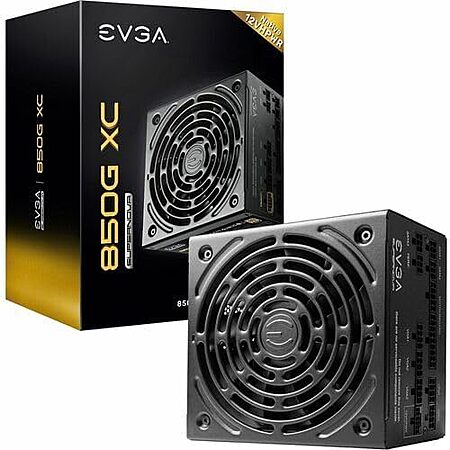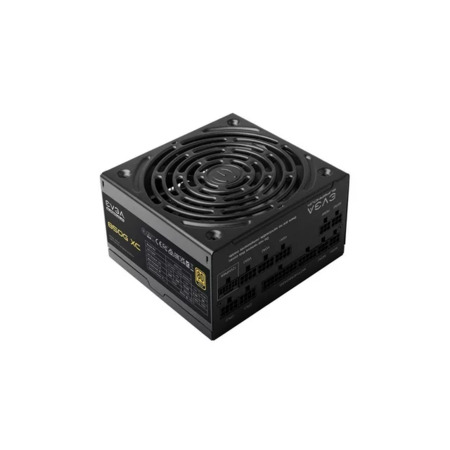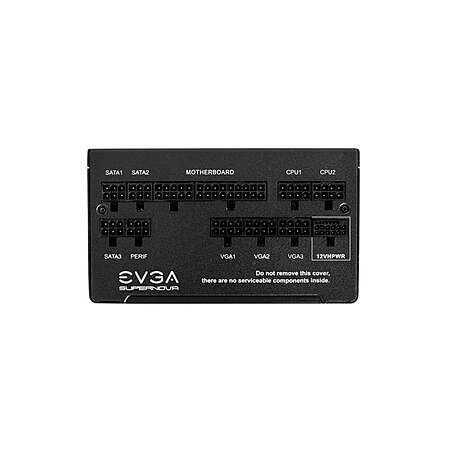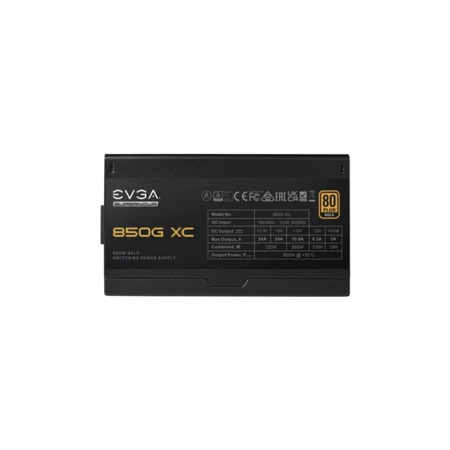3 Year Standard Limited Warranty "520-5G-0850-K1": -K0, -K1, -K2, -K3, -K4, -K5, -K6, -K7, -K8, -K9, -KR, -KB, -KA, -KF
https://www.evga.com/warranty/power-supplies/
Similar priced 850W supplies with better 10 year warranty
expiredSehoneyDP posted Feb 26, 2024 05:23 PM
Item 1 of 4
Item 1 of 4
expiredSehoneyDP posted Feb 26, 2024 05:23 PM
850W EVGA Supernova 850G XC ATX3.0 & PCIE 5 80 Plus Gold Fully Modular Power Supply
+ Free Shipping$100
$170
41% offNewegg
Visit NeweggGood Deal
Bad Deal
Save
Share




Leave a Comment
Top Comments
Efficiency will drop on either side of the 50% mark.
So if you are concerned with efficiency, make sure your total average load is 425 watts. The latest Intel 14900 chip can pull that much power by itself if you let it run without limit. Just be sure you know what you really need to power your system at it's maximum, and then choose a PSU based on 50% of that number for peak efficiency.
I have a 1300 watt platinum rated PSU in my rig because when it's crunching number under normal load, it's eating 600 to 700 watts continuously. I paid enough for the pieces and parts in this thing, I don't want to waste any in my electric bill.
All of this is just food for thought. Cheers 🍻 and good luck
It's been 110 most of Feb. It jumped to around 140.00 for a couple of days. Then dipped to this price.
The markup and then drop is a common thing to make the sale price look better than it is. If they sold any at the 140 price then they sell X amount at 99.99 price.. it averages back out to the month long 110 price.
camelcamelcamel site will lead you right
44 Comments
Sign up for a Slickdeals account to remove this ad.
Anyone buying a PSU now should be getting an ATX 3.0 PSU, especially where future-proofing is concerned. Bringing up non-3.0 PSUs is irrelevant.
I bought a 1000w 80+ gold Seasonic-made PSU to run SLI GTX 580s and to future-proof. It would shut down while gaming with the RTX 3080ti, but it did last me nearly 12 years. Meanwhile, the 850w 80+ gold CWT-made PSU I just bought runs the 3080ti all day long without an issue. I expect this 850w to last at least as long since I don't upgrade often and generally stay within the same wattage range when I do upgrade. In 10-15 years, a new PSU standard would probably be out anyways, making future-proofing now almost pointless. There's currently the push towards getting rid of the minor rails on the PSU and making it 12v only.
This is a thread on buying a new PSU, not utilizing what one already has. That makes your post all the more useless and pointless.
I guess my 4090 and 1600T2 aren't the absolute titans of their respective roles? Damn. Maybe I should take your advice and replace my T2 for a 850W Gold 3.0 then.
And arguing where a certain spec is for a certain price point ("show me a good...") is factually irrelevant. It is possible. My 1600T2 for $233.99 DID factually happen. So once again my point stands, because surely you're not implying that I should have spent $239.99 for an EVGA 1000G7 instead, right? https://www.newegg.com/evga-super...6817438
And yes, your comprehension skills are garbage. Nowhere did I tell anyone to keep the PSU they already have instead of buying this one or any new one for that matter. So that makes your last bit quite ironic...
I guess my 4090 and 1600T2 aren't the absolute titans of their respective roles? Damn. Maybe I should take your advice and replace my T2 for a 850W Gold 3.0 then.
And arguing where a certain spec is for a certain price point ("show me a good...") is factually irrelevant. It is possible. My 1600T2 for $233.99 DID factually happen. So once again my point stands, because surely you're not implying that I should have spent $239.99 for an EVGA 1000G7 instead, right? https://www.newegg.com/evga-super...6817438
And yes, your comprehension skills are garbage. Nowhere did I tell anyone to keep the PSU they already have instead of buying this one or any new one for that matter. So that makes your last bit quite ironic...
We're not discussing a deal that used to be. The discussion should be on what is available now. Buying massively oversized PSUs for future-proofing and efficiency reasons is dumb and stupid. Buying a top tier PSU because you want the absolute best is a different story entirely.
We're not discussing a deal that used to be. The discussion should be on what is available now. Buying massively oversized PSUs for future-proofing and efficiency reasons is dumb and stupid. Buying a top tier PSU because you want the absolute best is a different story entirely.
We're not discussing a deal that used to be. The discussion should be on what is available now. Buying massively oversized PSUs for future-proofing and efficiency reasons is dumb and stupid. Buying a top tier PSU because you want the absolute best is a different story entirely.
Hypothetical scenario: gaming computer that uses ~700 watts while gaming (because gaming does not fully stress out hardware), 800 watts fully loaded, and about 100 watts idling (an RTX 4090 can idle as low as 5 watts, typically 15-25 watts). Idling includes Youtube, office programs, and just about everything else low power. Seasonic's PRIME Ultra Titanium has an efficiency as follows based on KitGuru's testing of the 1000w unit:
92.14% at 10%
94.52% at 25%
96.11% at 50%
95.32% at 75%
94.23% at 100%
Extrapolating the efficiency curve for an 850 watt PSU in the above gaming computer, the efficiency at idle can be estimated at about 92.5% and gaming at about 95%. A 1600 watt PSU in the same scenario (to get 50% max power at max load) can be estimated at 90% efficiency (probably closer to 88% but I'll be generous) while idling and 96% while gaming. Watts wasted as a function of percentage of time spent idling (A) can thus be calculated as follows for each PSU:
100*0.075*A + 700*0.05*(1-A) for 850 watts
100*0.1*A + 700*0.04*(1-A) for 1600 watts
Simplifying it down and making them equal each other, we get the following equation where % of time spent idling required to save power overall on the 850 watt:
35-27.5A = 28-18A
9.5A = 7
A = 73.7%
In other words, you would have to spend at least 1/4 of your computer time gaming to have the 1600 watt PSU save power overall. This equation also shows that you will save about 7 watts while gaming on the 1600 watt PSU.
Let's take it one step further and see how much time you would need to spend gaming in order to recoup the investment in the 1600 watt PSU, again assuming titanium. The price spread between an 850 watt and 1600 watt PSU is $100-200. Assuming the computer is only used for gaming, the minimum amount of time to recoup the investment is as follows, with A as hours spent gaming. I'm going to use 50 cents per kwh as the current best case scenario for the US.
0.007*A*0.5 = 100 - 200 (cost differential)
0.0035A = 100 - 200
A = 28,571 - 57,143 hours
Assuming you spend on average 8 hours a day gaming, it will take 3,571 to 7,143 days, or about 10-20 years, to break even. This time extends longer if your computer spends time idling or your electric rate is lower than above and is shortened by running things that make full use of your computer's resources like distributed computing or rendering.
By the way, the above applies to going from 80+ gold to 80+ titanium as well. For an 850 watt PSU, you'll be paying a premium of $50-100 to gain ~4% on efficiency. That's about 4 watts at idle and 28 watts on gaming loads. You can do your own math on that.
Right. Why don't you prove me wrong and post your proof then? I'll do you one better and you can try to address it:
Hypothetical scenario: gaming computer that uses ~700 watts while gaming (because gaming does not fully stress out hardware), 800 watts fully loaded, and about 100 watts idling (an RTX 4090 can idle as low as 5 watts, typically 15-25 watts). Idling includes Youtube, office programs, and just about everything else low power. Seasonic's PRIME Ultra Titanium has an efficiency as follows based on KitGuru's testing of the 1000w unit:
92.14% at 10%
94.52% at 25%
96.11% at 50%
95.32% at 75%
94.23% at 100%
Extrapolating the efficiency curve for an 850 watt PSU in the above gaming computer, the efficiency at idle can be estimated at about 92.5% and gaming at about 95%. A 1600 watt PSU in the same scenario (to get 50% max power at max load) can be estimated at 90% efficiency (probably closer to 88% but I'll be generous) while idling and 96% while gaming. Watts wasted as a function of percentage of time spent idling (A) can thus be calculated as follows for each PSU:
100*0.075*A + 700*0.05*(1-A) for 850 watts
100*0.1*A + 700*0.04*(1-A) for 1600 watts
Simplifying it down and making them equal each other, we get the following equation where % of time spent idling required to save power overall on the 850 watt:
35-27.5A = 28-18A
9.5A = 7
A = 73.7%
In other words, you would have to spend at least 1/4 of your computer time gaming to have the 1600 watt PSU save power overall. This equation also shows that you will save about 7 watts while gaming on the 1600 watt PSU.
Let's take it one step further and see how much time you would need to spend gaming in order to recoup the investment in the 1600 watt PSU, again assuming titanium. The price spread between an 850 watt and 1600 watt PSU is $100-200. Assuming the computer is only used for gaming, the minimum amount of time to recoup the investment is as follows, with A as hours spent gaming. I'm going to use 50 cents per kwh as the current best case scenario for the US.
0.007*A*0.5 = 100 - 200 (cost differential)
0.0035A = 100 - 200
A = 28,571 - 57,143 hours
Assuming you spend on average 8 hours a day gaming, it will take 3,571 to 7,143 days, or about 10-20 years, to break even. This time extends longer if your computer spends time idling or your electric rate is lower than above and is shortened by running things that make full use of your computer's resources like distributed computing or rendering.
By the way, the above applies to going from 80+ gold to 80+ titanium as well. For an 850 watt PSU, you'll be paying a premium of $50-100 to gain ~4% on efficiency. That's about 4 watts at idle and 28 watts on gaming loads. You can do your own math on that.
I will break this all down and make it dirt simple:
Power efficiency is all about waste. The less you waste the higher the efficiency, period! All power supplies waste some power, that is why efficiency matters to those of us that care. The whole entire time a PC is powered on, it is wasting power, period! So efficiency ratings are a measure of how much of that power goes to waste.
For example using dollars and cents, because that is after all, the metric we care about most.
$1.00 spent at 100% efficiency ='s 100% of your money went into actual work being done. Nothing was lost or wasted.
$1.00 spent at 99% efficiency ='s 99% of your money went into actual work being done. $0.01 was wasted in electrical resistance and thermal losses.
$1.00 spent at 98% efficiency ='s 98% of your money went into actual work being done. $0.02 was wasted in electrical resistance and thermal losses.
$1.00 spent at 97% efficiency ='s 97% of your money went into actual work being done. $0.03 was wasted in electrical resistance and thermal losses.
$1.00 spent at 96% efficiency ='s 96% of your money went into actual work being done. $0.04 was wasted in electrical resistance and thermal losses.
$1.00 spent at 95% efficiency ='s 95% of your money went into actual work being done. $0.05 was wasted in electrical resistance and thermal losses.
Everyone can see how this works and how the losses add up over time. It makes no difference what you are doing with the PC, you are always wasting power, period! But you can minimize the waste by choosing a PSU that best suits your use case.
I don't game, but I do a lot of video work. I have a liquid cooled 13900K BIOS limited to 225 watts paired with a liquid cooled RTX 4090. My rig can pull some serious power if I let it. But it won't necessarily run faster at 800 watts than it does at 700 watts, but it will absolutely put out more heat at 800 vs 700!
I chose the MSI MEG Ai1300P for this system because I knew what my typical power draw was going to be and I was shooting for efficiency but also bang for the buck. I paid $184 for this 80+ platinum rated PSU which gives me a 92% efficiency rating at 50% load (650 watts), and that is exactly where my rig lives most of the time. So what that costs me in the long run is:
$1.00 spent at 92% efficiency ='s 92% of MY money went into actual work being done. $0.08 was wasted in electrical resistance and thermal losses.
I see no discussion here as I have only laid out facts. The numbers I provided in example are not debatable! But if you have an actual question to ask, I will try my best to answer to your understanding. I mean no disrespect, but the facts are the facts.
Cheers 🍻
Sign up for a Slickdeals account to remove this ad.
I will break this all down and make it dirt simple:
Power efficiency is all about waste. The less you waste the higher the efficiency, period! All power supplies waste some power, that is why efficiency matters to those of us that care. The whole entire time a PC is powered on, it is wasting power, period! So efficiency ratings are a measure of how much of that power goes to waste.
For example using dollars and cents, because that is after all, the metric we care about most.
$1.00 spent at 100% efficiency ='s 100% of your money went into actual work being done. Nothing was lost or wasted.
$1.00 spent at 99% efficiency ='s 99% of your money went into actual work being done. $0.01 was wasted in electrical resistance and thermal losses.
$1.00 spent at 98% efficiency ='s 98% of your money went into actual work being done. $0.02 was wasted in electrical resistance and thermal losses.
$1.00 spent at 97% efficiency ='s 97% of your money went into actual work being done. $0.03 was wasted in electrical resistance and thermal losses.
$1.00 spent at 96% efficiency ='s 96% of your money went into actual work being done. $0.04 was wasted in electrical resistance and thermal losses.
$1.00 spent at 95% efficiency ='s 95% of your money went into actual work being done. $0.05 was wasted in electrical resistance and thermal losses.
Everyone can see how this works and how the losses add up over time. It makes no difference what you are doing with the PC, you are always wasting power, period! But you can minimize the waste by choosing a PSU that best suits your use case.
I don't game, but I do a lot of video work. I have a liquid cooled 13900K BIOS limited to 225 watts paired with a liquid cooled RTX 4090. My rig can pull some serious power if I let it. But it won't necessarily run faster at 800 watts than it does at 700 watts, but it will absolutely put out more heat at 800 vs 700!
I chose the MSI MEG Ai1300P for this system because I knew what my typical power draw was going to be and I was shooting for efficiency but also bang for the buck. I paid $184 for this 80+ platinum rated PSU which gives me a 92% efficiency rating at 50% load (650 watts), and that is exactly where my rig lives most of the time. So what that costs me in the long run is:
$1.00 spent at 92% efficiency ='s 92% of MY money went into actual work being done. $0.08 was wasted in electrical resistance and thermal losses.
I see no discussion here as I have only laid out facts. The numbers I provided in example are not debatable! But if you have an actual question to ask, I will try my best to answer to your understanding. I mean no disrespect, but the facts are the facts.
Cheers 🍻
Also, since you can't be bothered to read in full, I've done the math on how long it takes for it to add up. You can adjust the math to fit your particular use scenario.
I will break this all down and make it dirt simple:
Power efficiency is all about waste. The less you waste the higher the efficiency, period! All power supplies waste some power, that is why efficiency matters to those of us that care. The whole entire time a PC is powered on, it is wasting power, period! So efficiency ratings are a measure of how much of that power goes to waste.
For example using dollars and cents, because that is after all, the metric we care about most.
$1.00 spent at 100% efficiency ='s 100% of your money went into actual work being done. Nothing was lost or wasted.
$1.00 spent at 99% efficiency ='s 99% of your money went into actual work being done. $0.01 was wasted in electrical resistance and thermal losses.
$1.00 spent at 98% efficiency ='s 98% of your money went into actual work being done. $0.02 was wasted in electrical resistance and thermal losses.
$1.00 spent at 97% efficiency ='s 97% of your money went into actual work being done. $0.03 was wasted in electrical resistance and thermal losses.
$1.00 spent at 96% efficiency ='s 96% of your money went into actual work being done. $0.04 was wasted in electrical resistance and thermal losses.
$1.00 spent at 95% efficiency ='s 95% of your money went into actual work being done. $0.05 was wasted in electrical resistance and thermal losses.
Everyone can see how this works and how the losses add up over time. It makes no difference what you are doing with the PC, you are always wasting power, period! But you can minimize the waste by choosing a PSU that best suits your use case.
I don't game, but I do a lot of video work. I have a liquid cooled 13900K BIOS limited to 225 watts paired with a liquid cooled RTX 4090. My rig can pull some serious power if I let it. But it won't necessarily run faster at 800 watts than it does at 700 watts, but it will absolutely put out more heat at 800 vs 700!
I chose the MSI MEG Ai1300P for this system because I knew what my typical power draw was going to be and I was shooting for efficiency but also bang for the buck. I paid $184 for this 80+ platinum rated PSU which gives me a 92% efficiency rating at 50% load (650 watts), and that is exactly where my rig lives most of the time. So what that costs me in the long run is:
$1.00 spent at 92% efficiency ='s 92% of MY money went into actual work being done. $0.08 was wasted in electrical resistance and thermal losses.
I see no discussion here as I have only laid out facts. The numbers I provided in example are not debatable! But if you have an actual question to ask, I will try my best to answer to your understanding. I mean no disrespect, but the facts are the facts.
Cheers
It's essentially an argument of combined MPG vs MPG only at 70 mph. You might only care about max MPG at 70 mph because 90% of your time is at 70 mph but that's not most people
You might also want to get a Kill-A-Watt meter because you are overestimating your power draw and time at peak.
Also, since you can't be bothered to read in full, I've done the math on how long it takes for it to add up. You can adjust the math to fit your particular use scenario.
Understand what we're getting at here?
It's essentially an argument of combined MPG vs MPG only at 70 mph. You might only care about max MPG at 70 mph because 90% of your time is at 70 mph but that's not most people
You might also want to get a Kill-A-Watt meter because you are overestimating your power draw and time at peak.
The point I've tried to make all along is that in my case, a 1600T2 was $234 during the peak of the Ethereum craze when anything north of 800W went for premiums never seen before. The next realistic alternative I had at the time was a 1000W gold for about $260. *At that time* it was the best bang for the buck. Nobody in their right mind should pick an inferior product for a higher cost, especially when you needed it for high loads such as participating yourself in said Ethereum craze. Sure, we are *not* arguing a past deal here, I agree. My point is that scenarios all too similar happen all the time, and my point is to not be that person paying more for an inferior product. End of point. It's literally that simple. But someone continues trying to dunk on everyone because somehow we're wrong.
Also, since you can't be bothered to read in full, I've done the math on how long it takes for it to add up. You can adjust the math to fit your particular use scenario.
It's essentially an argument of combined MPG vs MPG only at 70 mph. You might only care about max MPG at 70 mph because 90% of your time is at 70 mph but that's not most people
You might also want to get a Kill-A-Watt meter because you are overestimating your power draw and time at peak.
Leave a Comment